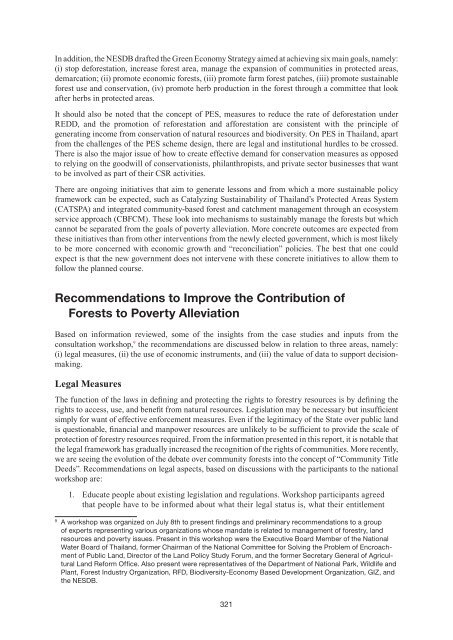Contribution of Forestry to Poverty Alleviation - APFNet
Contribution of Forestry to Poverty Alleviation - APFNet
Contribution of Forestry to Poverty Alleviation - APFNet
Create successful ePaper yourself
Turn your PDF publications into a flip-book with our unique Google optimized e-Paper software.
In addition, the NESDB drafted the Green Economy Strategy aimed at achieving six main goals, namely:<br />
(i) s<strong>to</strong>p deforestation, increase forest area, manage the expansion <strong>of</strong> communities in protected areas,<br />
demarcation; (ii) promote economic forests, (iii) promote farm forest patches, (iii) promote sustainable<br />
forest use and conservation, (iv) promote herb production in the forest through a committee that look<br />
after herbs in protected areas.<br />
It should also be noted that the concept <strong>of</strong> PES, measures <strong>to</strong> reduce the rate <strong>of</strong> deforestation under<br />
REDD, and the promotion <strong>of</strong> reforestation and afforestation are consistent with the principle <strong>of</strong><br />
generating income from conservation <strong>of</strong> natural resources and biodiversity. On PES in Thailand, apart<br />
from the challenges <strong>of</strong> the PES scheme design, there are legal and institutional hurdles <strong>to</strong> be crossed.<br />
There is also the major issue <strong>of</strong> how <strong>to</strong> create effective demand for conservation measures as opposed<br />
<strong>to</strong> relying on the goodwill <strong>of</strong> conservationists, philanthropists, and private sec<strong>to</strong>r businesses that want<br />
<strong>to</strong> be involved as part <strong>of</strong> their CSR activities.<br />
There are ongoing initiatives that aim <strong>to</strong> generate lessons and from which a more sustainable policy<br />
framework can be expected, such as Catalyzing Sustainability <strong>of</strong> Thailand’s Protected Areas System<br />
(CATSPA) and integrated community-based forest and catchment management through an ecosystem<br />
service approach (CBFCM). These look in<strong>to</strong> mechanisms <strong>to</strong> sustainably manage the forests but which<br />
cannot be separated from the goals <strong>of</strong> poverty alleviation. More concrete outcomes are expected from<br />
these initiatives than from other interventions from the newly elected government, which is most likely<br />
<strong>to</strong> be more concerned with economic growth and “reconciliation” policies. The best that one could<br />
expect is that the new government does not intervene with these concrete initiatives <strong>to</strong> allow them <strong>to</strong><br />
follow the planned course.<br />
Recommendations <strong>to</strong> Improve the <strong>Contribution</strong> <strong>of</strong><br />
Forests <strong>to</strong> <strong>Poverty</strong> <strong>Alleviation</strong><br />
Based on information reviewed, some <strong>of</strong> the insights from the case studies and inputs from the<br />
consultation workshop, 9 the recommendations are discussed below in relation <strong>to</strong> three areas, namely:<br />
(i) legal measures, (ii) the use <strong>of</strong> economic instruments, and (iii) the value <strong>of</strong> data <strong>to</strong> support decisionmaking.<br />
Legal Measures<br />
The function <strong>of</strong> the laws in defining and protecting the rights <strong>to</strong> forestry resources is by defining the<br />
rights <strong>to</strong> access, use, and benefit from natural resources. Legislation may be necessary but insufficient<br />
simply for want <strong>of</strong> effective enforcement measures. Even if the legitimacy <strong>of</strong> the State over public land<br />
is questionable, financial and manpower resources are unlikely <strong>to</strong> be sufficient <strong>to</strong> provide the scale <strong>of</strong><br />
protection <strong>of</strong> forestry resources required. From the information presented in this report, it is notable that<br />
the legal framework has gradually increased the recognition <strong>of</strong> the rights <strong>of</strong> communities. More recently,<br />
we are seeing the evolution <strong>of</strong> the debate over community forests in<strong>to</strong> the concept <strong>of</strong> “Community Title<br />
Deeds”. Recommendations on legal aspects, based on discussions with the participants <strong>to</strong> the national<br />
workshop are:<br />
1. Educate people about existing legislation and regulations. Workshop participants agreed<br />
that people have <strong>to</strong> be informed about what their legal status is, what their entitlement<br />
9 A workshop was organized on July 8th <strong>to</strong> present findings and preliminary recommendations <strong>to</strong> a group<br />
<strong>of</strong> experts representing various organizations whose mandate is related <strong>to</strong> management <strong>of</strong> forestry, land<br />
resources and poverty issues. Present in this workshop were the Executive Board Member <strong>of</strong> the National<br />
Water Board <strong>of</strong> Thailand, former Chairman <strong>of</strong> the National Committee for Solving the Problem <strong>of</strong> Encroachment<br />
<strong>of</strong> Public Land, Direc<strong>to</strong>r <strong>of</strong> the Land Policy Study Forum, and the former Secretary General <strong>of</strong> Agricultural<br />
Land Reform Office. Also present were representatives <strong>of</strong> the Department <strong>of</strong> National Park, Wildlife and<br />
Plant, Forest Industry Organization, RFD, Biodiversity-Economy Based Development Organization, GIZ, and<br />
the NESDB.<br />
321


